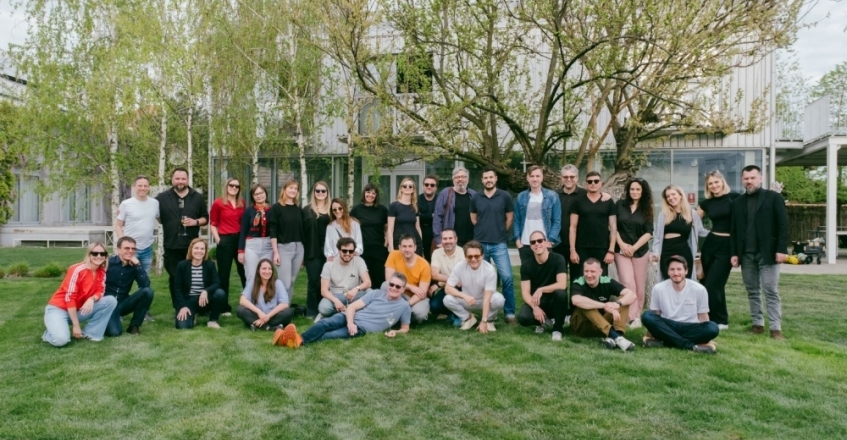News
Forum "Exploring Synergies: Managing Intellectual Property Across Creative Industries" held in Mokrin
Titled "Exploring Synergies: Managing Intellectual Property Across Creative Industries," the forum was supported by UNESCO and was endorsed through the "Culture and Creativity for the Western Balkans" (CC4WBs) programme funded by the European Union
The forum "Exploring Synergies: Managing Intellectual Property Across Creative Industries" was successfully held at Mokrin in Serbia. Organized by the CineLink Industry Days of the Sarajevo Film Festival in partnership with the Regional Film and TV Academy, the three-day forum focused on the synergy between audiovisual and publishing industries, with presentations and discussions on intellectual property rights management in creative industries.
Titled "Exploring Synergies: Managing Intellectual Property Across Creative Industries," the forum was supported by UNESCO and was endorsed through the "Culture and Creativity for the Western Balkans" (CC4WBs) programme funded by the European Union.
The forum took place from April 5th to 8th at Mokrin House in Serbia. Over the course of three days, participants had the opportunity to engage in discussions on adaptations, exchange experiences and knowledge, and familiarize themselves with contemporary regional writers and the latest trends in regional publishing. Katarina Mitrović and Bojan Vuletić presented the scriptwriting process for the drama series CHILDREN OF EVIL (2023) based on the novel of the same name by Miodrag Majić. Barbara Daljavec, the producer from RTV SLO, and Matevž Luzar, the screenwriter, presented a case study of the drama series THE LAKE (2019) based on the novel of the same name by Tadej Golob. Marjan Alčevski, the screenwriter, introduced THE SILENCE (2021-2023) inspired by the trilogy of Drago Hedl. Producer Zorana Popović discussed the adaptation process of scripted formats for the local market using the famous sitcom ANDRIJA I ANĐELKA as a case study.
Two moderated discussions were held with producer, director, and actor Dragan Bjelogrlić and scriptwriter Elma Tataragić. Renowned regional publishers Ivan Bevc (BOOKA, Serbia) and Seid Serdarević (Fraktura, Croatia) presented a selection of titles to producers, directors, and scriptwriters as potential adaptations. Regional writers (Rumena Bužarovska, Almin Kaplan, Filip Grujić, and Stefan Bošković) presented their successful books and shared their experiences and challenges in the adaptation process.
Participants expressed satisfaction with the first organized meeting of this kind and expressed hope that these activities would continue at the 30th Sarajevo Film Festival, which will be held from August 16th to 23rd, 2024.
Here's what some of the attendees had to say:
Jovan Marjanović, Director of the Sarajevo Film Festival: "The audiovisual industry is at a turning point. On one hand, content production has significantly increased, but on the other hand, there is a lack of content shaped into usable intellectual property across various media. Such meetings, which go beyond just one industry - the film industry, have shown how necessary they are in terms of contemplating future content trends. The publishing industry has so much new, fresh intellectual property, literary works whose authors are some of the most brilliant young regional writers, that using these works in the audiovisual industry will enable not only additional quantity but also quality."
Bojan Vuletić, screenwriter, and director: "The direct exchange of experiences among professionals from the countries of the former Yugoslavia, as a unique opportunity to meet and discuss the most current topics related to TV series production, has shown the necessity of such workshops. The forum in Mokrin brought up the question of adapting literary works into TV series, issues of authorship, franchises, all in line with modern trends that are dynamically evolving. The position of small, independent production companies versus platforms and cable operators, the placement of TV series, and survival in the market, which involves trying out new formats and genres, as well as their adaptation for different (linguistic, cultural, and geographical) markets, was the dominant theme of these meetings. The competitiveness of regional productions on a global scale has raised many questions about the author-producer-product relationship, and the need for further meetings of this type arises as natural and necessary."
Rumena Bužarovska, writer: "This creative gathering has long been needed in our region. Not only have we exchanged experiences in the work process of different professionals, learning a lot from each other and naturally networking, creating friendships, but we have also had long and dedicated discussions on various topics related to narrative, politics, and society. Initiatives like this have the potential to change society through storytelling, as literature does, and as film does."
Milan Stojanović, producer: "Although I already have some, albeit modest, experience in adapting literary works for film and TV, it was very useful to hear diverse views, desires, and concerns from writers whose works are being adapted, as well as from publishers and screenwriters who work or have worked on adaptations. It was nice to have the opportunity to share experiences and insights into the position of producers, whose role in adaptations is often more significant than in original film and TV works. I think this workshop or 'think tank' was a bullseye because it brought together a group of people who address the same audience through various media, so the opportunity to talk and exchange ideas was a sure first step towards better communication and collaboration in the future. The atmosphere created in Mokrin not only encouraged cooperation but also fostered many new friendships."
***
The “Culture and Creativity for the Western Balkans” (CC4WBs) project, funded by the European Union, is focused on fostering dialogue in the Western Balkans by enhancing the cultural and creative sectors for increased socio-economic impact. Over a 48-month period, the CC4WBs project aims to improve the performance of the cultural and creative sectors in order to enhance skills, knowledge, access to financial aid to increase competitiveness and sustain co-production and circulation of goods and services in the Western Balkans.






